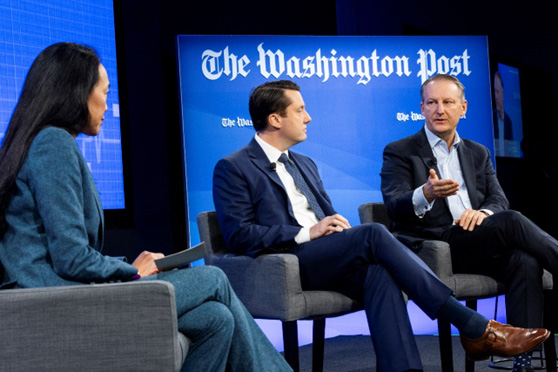Family Medicine Advocacy Rounds, November 2023
AAFP responds to 2024 Medicare Physician Fee Schedule final rule, weighs in against flavored tobacco products, and more
By AAFP’s Federal Advocacy Team
AAFP welcomes new president
On October 27, Steven P. Furr, MD, a family physician in Jackson, Alabama, was installed as AAFP president. In this role, Furr will advocate on behalf of family physicians and patients across the country to inspire positive changes in the U.S. health care system.
“The AAFP has been a cornerstone in my family medicine career — one that has helped me gain immeasurable knowledge, experiences and the ability to connect with family physicians across the country,” Furr said. “During a time where the health care landscape is changing rapidly, we need family physicians as local, state, and national leaders who are willing to do the hard but exciting work of improving our health care system for all. I look forward to each of us making that kind of difference during my time as president.”
Learn more about Furr’s advocacy priorities as AAFP president, including protecting physician payment, reducing administrative burdens, and growing the physician workforce, in recent interviews with Healio and MedPage Today.
AAFP also welcomed new board members to its 2023-2024 board of directors.
AAFP responds to 2024 Medicare Physician Fee Schedule final rule
Why it matters:
Family physicians provide comprehensive, continuous primary care to patients across the lifespan, but inadequate Medicare payment rates strain physician practices and create barriers to care for enrollees. Many other health care payers and programs base their payment rates on the Medicare physician fee schedule, including TriCARE, state Medicaid agencies, and other insurers, so it is important that Medicare physician payments appropriately value primary care and keep pace with the costs of running a practice.
We are pleased to see CMS take steps to bolster primary care. Specifically, family physicians deeply appreciate the full implementation of the G2211 Medicare add-on code, which will more appropriately value the complex, continuous services they provide—including managing chronic conditions and acute problems, modifying medication doses, administering vaccines, providing preventive screenings, and counseling on healthy habits.
“The AAFP applauds CMS for finalizing new policies in the 2024 MPFS to better support access to high-quality care, including the full implementation of the G2211 Medicare add-on code. However, the finalized reduction to the Medicare conversion factor will result in untenable payment cuts for family physicians and reiterates the urgent need for long-term Medicare payment reform.”
What we’re working on:
- AAFP’s statement stresses the urgent need for long-term Medicare payment reform. Practices across specialties report challenges meeting growing patient needs as practice costs rise and annual, compounding Medicare payment cuts undermine practice viability and patient access.
- The AAFP continues to call on Congress to end unsustainable physician payment cuts by enacting an annual inflationary update, reforming arbitrary Medicare budget neutrality requirements, and investing in community-based primary care.
- Dr. Furr and AAFP President-elect Jennifer L. Brull, MD, engaged with policymakers on Capitol Hill last week to discuss how implementation of G2211 will improve patients’ access to primary care and other longitudinal services.
- In October, Dr. Furr testified before the U.S. House Energy and Commerce Subcommittee on Health during a hearing titled “What’s the Prognosis?: Examining Medicare Proposals to Improve Patient Access to Care & Minimize Red Tape for Doctors.” He focused on the importance of fine-tuning Medicare payment to best serve seniors and strengthen the program, including by increasing physician payment.
AAFP supports rule to end sale of menthol cigarettes and all flavored cigars
Why it matters:
There is clear evidence that flavored tobacco products, including menthol, are particularly addictive for young people. Family physicians know that eliminating menthol cigarettes will save lives and promote health equity among disproportionately affected communities.
What we’re working on:
- AAFP joined the American Heart Association and 80 other health organizations in voicing “full support” for prohibiting menthol cigarettes and all flavored cigars in a full-page Washington Post ad.
- AAFP has long supported the proposed regulation to end the sale of menthol flavored cigarettes and all flavored cigars, and we continue to support the Food and Drug Administration in finalizing these regulations.
- Prohibiting the sale of menthol cigarettes and flavored cigars would mark a historic turning point in the decades-long battle against tobacco use and the epidemic of tobacco-related disease.
- AAFP continues to call for the elimination of all flavors in electronic nicotine delivery systems (ENDS or e-cigarettes), including menthol and vendor-mixed flavors. AAFP also supports an immediate reduction in the nicotine content of tobacco products to non-addictive levels.
AAFP has repeatedly called for additional research to assess e-cigarettes’ safety, quality, and efficacy as potential cessation devices, but to date, there is insufficient evidence to conclude that e-cigarettes in general are effective for smoking cessation. This is especially true for flavored e-cigarettes.
AAFP weighs in on the importance of measuring primary care spending
Why it matters:
A standardized approach to measuring and reporting on primary care spending at the national level is a vital step toward meaningfully increasing our investment in primary care. Advancing a standardized approach to measurement will enable more states to measure and report on primary care spending, facilitate improvements in relevant data, and provide policymakers and other stakeholders with actionable information to improve equitable access to primary care.
With support from the Milbank Memorial Fund and the Physicians Foundation, AAFP’s Robert Graham Center developed and published a primary care scorecard that includes measurements of primary care spending in several states. While this represents an important measure of progress, the national survey data used for primary care spending in this scorecard are not available at the state level for all 50 states.
To that end, AAFP voiced support for a technical brief on measuring primary care health spending from the Agency for Health Care Research and Quality.
What we’re working on:.
- In its comment letter, AAFP emphasized the urgent need for a standardized approach to measuring primary care spending at the national level, which should not be delayed in development of new consensus definitions or create new data sets.

AAFP EVP and CEO discusses health care affordability
During a Washington Post Live event, AAFP Executive Vice President and CEO R. Shawn Martin joined Blue Cross Blue Shield Association’s chief corporate affairs officer, Sean Robbins, to discuss how payers and physicians can come together to make health care more affordable for everyone. Martin highlighted the importance of family medicine and the pivotal role it plays in improving health care and lowering costs. Read more about the conversation here.
For the latest policy updates impacting family medicine, follow us at @aafp_advocacy.
